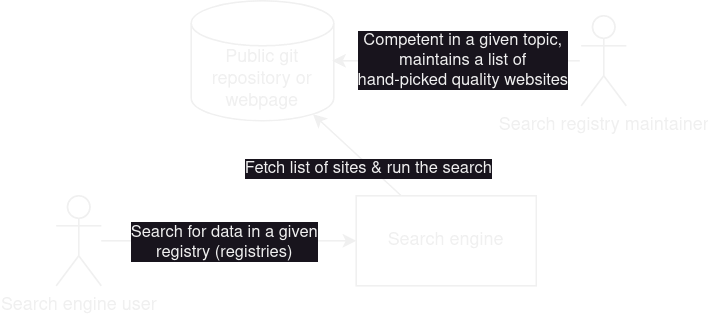Bringing human-run sites back into search results.
Update: I found a somewhat similar project: LinkWarden.
Problem outline
Let's face it, most of the sites you now see when using a search engine are AI generated. Either to position the site higher in the search results or to make it seem more lively, the majority of big sites utilise some kind of automated content generation.
POV: you just wanted to google a recipe for scrambled eggs:
When our son, Chris, wants something other than cold cereal in the morning, he whips up these eggs. Cheese and evaporated milk make them especially good. They’re easy to make when you’re camping, too. —Chris Pfleghaar, Elk River, Minnesota
It's making our search results worse, as the actual information gets obscufated behind a wall of AI-generated SEO nonsense. We cannot expect the companies behind search engines to improve the situation, as they benefit from the ads they serve us, while we scroll through paragraphs of banalities.
Possible solutions
You could move to search engines that only index minimalist websites or to the ones that only index a hand-picked list of pages. Hell, you could even write some pre-processor for searx that would filter out the sites that don't pass a GPT-detector check.

While those solutions certainly have potential, it will be hard to scale them further without any standarisation. I'm here to propose one. Allow me to introduce search engine registries (name subject to change).
Overview
A search engine registry is a list of websites that is hosted as a plain
text file under some url. The end user may use any set of registries
while making a query to a search engine. And the search engine will only
display results from the sites present in the selected registers.

Principles
Decentralised
Just as someone can run their own search engine instance, people and institutions may run their own search registries. Just put them out onto your website or a git repository, any link will do!
Run by real people and institutions
-
Your university may run a registry containing a set of pages that they trust when doing research (blogs of other researchers, science news websites, etc)
-
An expert may run a registry of websites that they've validated to contain true information
-
A journalist may run a registry of websites run by other journalists that they find competent
-
An organisation which is developing a programming language may run a registry with curated resources for that language
-
Your goverment may run a registry containing websites that serve official goverment information
Uses a simple and open standard
$ curl -v https://person-i-trust.com/registry
< content-type: text/plain
llllllll.co
xxiivv.com
github.comThat's all!
(Maybe add comments to sites? Could be cool)
And most importantly
You, the end user, are free to pick your own set of registries.
Useful links:
- build your own search engine
- "Grasp" search engine, a product built around this niche, although with quite strict limits for running search queries (20 queries/month on free tier as of may 2023)